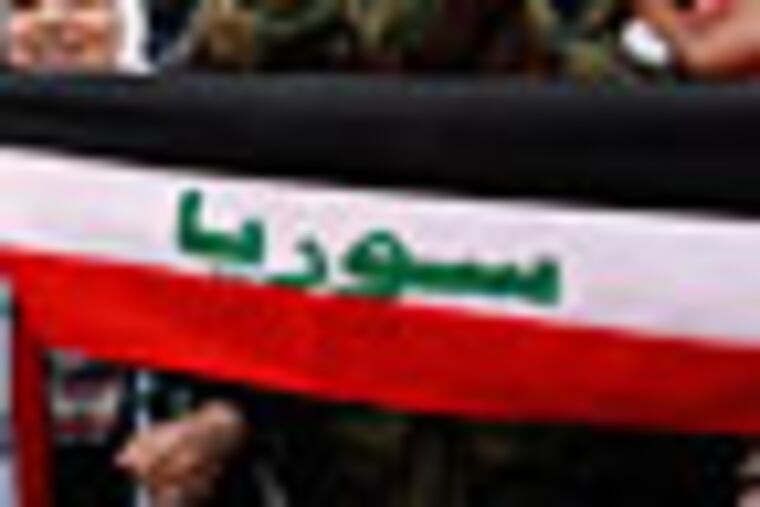Mass protests across Syria
BEIRUT, Lebanon - In the largest protests Syria has seen in months, hundreds of thousands of people took to the streets Friday in a display of defiance to show an Arab League observer mission the strength of the opposition movement.

BEIRUT, Lebanon - In the largest protests Syria has seen in months, hundreds of thousands of people took to the streets Friday in a display of defiance to show an Arab League observer mission the strength of the opposition movement.
Despite the monitors' presence in the country, activists said Syrian forces loyal to President Bashar al-Assad killed at least 22 people, most of them shot during the antigovernment demonstrations.
In a further attempt to appeal to the monitors, dissident troops who have broken away from the Syrian army said they had halted attacks on regime forces to reinforce the activists' contention that the uprising against Assad is a peaceful movement.
While opposition activists are deeply skeptical of the observer mission, the outpouring of demonstrators underscores their wish to make their case to the foreign monitors and take advantage of the small measure of safety they feel the monitors brought with them.
The nearly 100 Arab League monitors are the first that Syria has allowed in during the uprising, which began in March. They are supposed to ensure that the regime complies with the league's plan to end Assad's crackdown on dissent. The United Nations says more than 5,000 people have died as the government has sought to crush the revolt.
Friday's crowds were largest in Idlib and Hama provinces, with about 250,000 people turning out in each area, according to an activist and eyewitness who asked to be identified only as Manhal because he feared government reprisal. Other big rallies were held in Homs and Daraa provinces and the Damascus suburb of Douma, said Rami Abdul-Raham, who heads the British-based Syrian Observatory for Human Rights.
The crowd estimates could not be independently confirmed because Syria has banned most foreign journalists and tightly restricts the local media.
Haytham Manna, a prominent Paris-based dissident and defender of human rights, said the observers' presence had emboldened protesters to take to the streets in huge numbers.
"Whether we like it or not, the presence of observers has had a positive psychological effect, encouraging people to stage peaceful protests - a basic condition of the Arab League peace plan," he said.
The observers began their mission Tuesday in Homs, which many Syrians call the "Capital of the Revolution." Since then, they have fanned out in small groups across Syrian provinces, including the restive Idlib province in the north, Hama in the center, and the southern province of Daraa, where the revolt began.
The orange-jacketed observers have been seen taking pictures of the destruction, visiting families of victims of the crackdown, and taking notes.
On Friday, they were within "hearing distance" from where troops opened fire on tens of thousands of protesters in Douma, activist Salim al-Omar said. They later visited the wounded in the hospital, he added.
Despite questions about the human rights record of the man leading the monitors, tens of thousands have turned out this week in cities and neighborhoods where they were expected to visit.
The huge rallies have been met by lethal gunfire from security forces, apparently worried about multiple mass sit-ins modeled after Cairo's Tahrir Square. In general, activists say, security forces have launched attacks when observers were not present. But there have been some reports of firing on protesters while monitors were nearby.
Omar Shaker, an activist and resident of the battered neighborhood of Baba Amr in Homs, said the observers were "laughable," often walking around with outdated cameras and without pens.
"Still, the bombardment and killings have decreased here in their presence," he said. "We see them as a kind of human shield, that's all."
Developments in the Region
![]() Yemen. Tens of thousands demonstrated around the country Friday to demand that President Ali Abdullah Saleh face trial for the killings of hundreds of unarmed protesters in the pro-democracy uprising that began 10 months ago.
Yemen. Tens of thousands demonstrated around the country Friday to demand that President Ali Abdullah Saleh face trial for the killings of hundreds of unarmed protesters in the pro-democracy uprising that began 10 months ago.
Saleh has signed a deal granting him immunity in return for stepping down, has transferred his powers to his vice president, and has said he intends to travel to the United States for medical treatment. Many protesters object that the deal does not include far-reaching political changes or allow for Saleh to be tried. Protesters on Friday carried pictures of Saleh with the words, "You will not escape punishment."
![]() Bahrain. Riot police fired tear gas to disperse several hundred protesters among thousands who took to the streets Friday to demand that the government resign after a report uncovered torture and other abuses against detainees. Bahrain's Shiites complain of widespread discrimination under the kingdom's Sunni rulers. The monarchy has offered some concessions but refused to bow to demands for greater freedoms.
Bahrain. Riot police fired tear gas to disperse several hundred protesters among thousands who took to the streets Friday to demand that the government resign after a report uncovered torture and other abuses against detainees. Bahrain's Shiites complain of widespread discrimination under the kingdom's Sunni rulers. The monarchy has offered some concessions but refused to bow to demands for greater freedoms.
- Associated Press
EndText